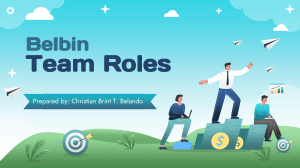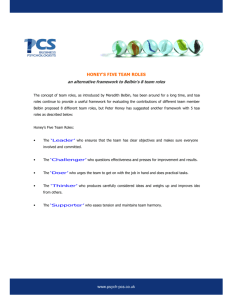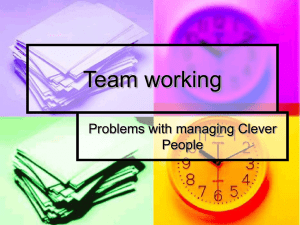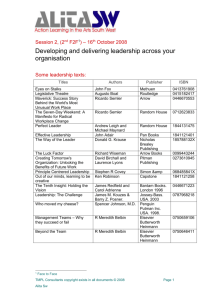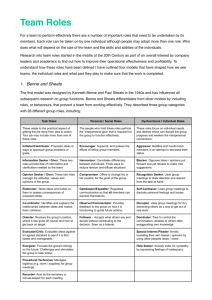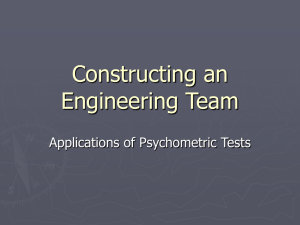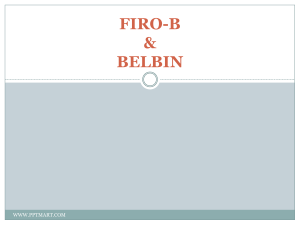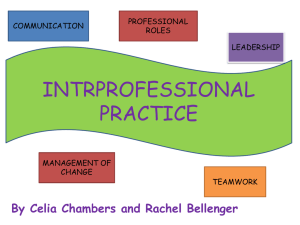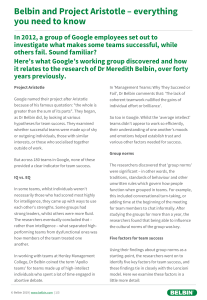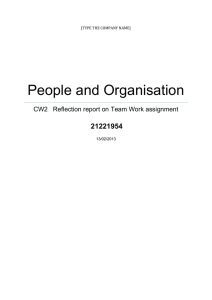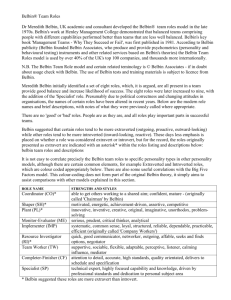Unit 02. Building Te..
advertisement
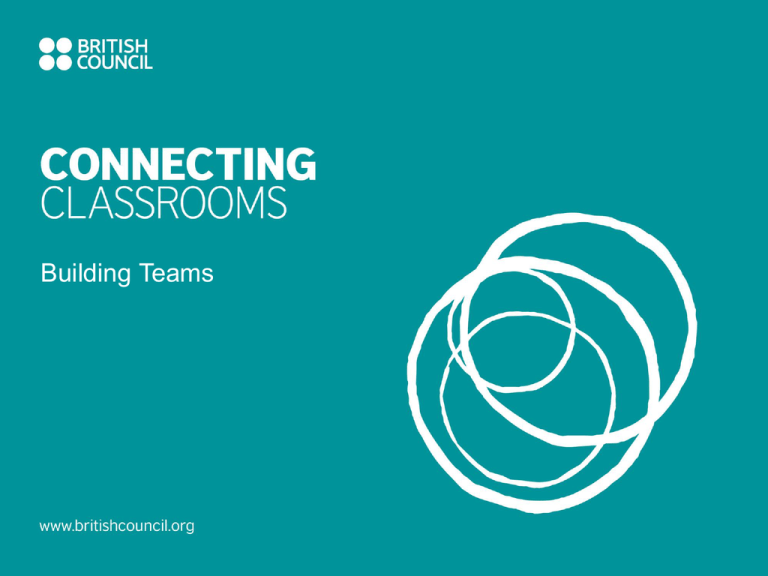
Building Teams Building Teams Objectives 1. 2. 3. 4. 5. 6. 7. 8. 9. 10. Understanding the purpose of teams Considering models of teams Mindfulness about keeping people on board Overcoming resistance The stages of a team The 9 roles in effective teams Awareness of team member’s emotions The Pareto Principle Considering commitment levels Actions to take Building Teams 2 What is a Team? A team comprises a group of people linked in a common purpose. Teams are especially appropriate for conducting tasks that are high in complexity and have many interdependent subtasks. A group in itself does not necessarily constitute a team. With thanks to Wikipedia Building Teams 3 Why is team building so important in Connecting Classrooms? • • • • • To engage a diversity of cultures, working practices and languages To share strengths, responsibilities and resources To overcome obstacles together Partners are dispersed and may feel isolated Meetings are infrequent & intensive Building Teams 4 Building Teams 5 Building Teams 6 Building Teams 7 Q1. Model A 1. Why have we called this a “ME” team? 2. Who in the team you are thinking about forms the little circle of three arrows all on their own and not actively supporting the team? 3. Is their in fact a few individuals all on their own as on the left hand side? Are any of them supporting you? How would you describe them? 4. Who’s the powerful person in green heading in the ‘wrong’ direction? 5. Who are you? 6. Where is the team heading? Building Teams 8 Q2. Model B 1. 2. 3. 4. Why have we called this the “WE” team? Who’s the long red person? Are they waiting for retirement? Who’s the green MBA student (for example)? Who’s the short red person squeezed and constrained? Building Teams 9 Q3. Model C 1. Why have we called this the “US” team? 2. Reflecting now on the three models what are the views of the participants about these and do they see them in their schools? 3. What sort of model would they like to have for the CC team? 4. What are the challenges for the CC team? 5. How can these challenges be overcome? Building Teams 10 How do we keep people on board as we go on the journey? Building Teams 11 Q4. Leading on the train journey • • How do we as leaders alert staff to “tunnels” and empathise with them as they enter the tunnels? How do we ensure that we don’t become too blasé about the challenges? Building Teams 12 Resistance Gaining acceptance goes through the process below, starting with those who are most likely to accept change - innovators - until finally the laggards are won over - or leave. Use the innovators as Ambassadors of Progress. Building Teams 13 Q5. Resistance • Does the graph look familiar to the reaction you have observed when bringing about changes in your school? • How have you managed this in the past? • Will you experience something like this with the CC project? Building Teams 14 The Stages of a Team Building Teams 15 Q6. The stages of a team Take a moment to reflect on the stages of a team. •Have you observed this cycle in teams you have been in or formed yourself? •How can you use this information in terms of the CC team you have formed or are forming? Building Teams 16 Forming a Dream Team Building Teams 17 The nine Belbin roles • • • • • • • • • The resource investigator The implementer The chair (coordinator) The monitor/evaluator The innovator (plant) The team worker The completer/finisher The specialist The shape Building Teams 18 Activity 1 Match these titles to the descriptors in your PRM Building Teams 19 The nine Belbin roles Role The chair (coordinator) The shaper The implementer The completer/finisher The innovator (plant) The monitor/evaluator Description I try to coordinate my students and teaching colleagues efforts I like to identify people’s strengths and put them to good use I often give (delegate) tasks to the best person for the job I really want my team to succeed I focus my team on our objectives and priorities I try to keep the team focused on the activity I like to turn ideas and plans into practical tasks I often take on tasks others won’t do I usually get things done on time I like to check details carefully so there are no mistakes I often keep an eye on time, deadlines and accuracy I worry about details (maybe too much, sometimes) I like to suggest new ideas and creative solutions I often identify new opportunities I usually see problems as opportunities I try to evaluate ideas objectively to see if they are realistic I like to interpret and evaluate complex issues logically I like to consider all available options to reach the right conclusion The resource investigator I like to keep the team in touch with what is happening outside the team I enjoy learning about ideas, information, developments in the outside world I will happily ‘steal’ or copy good ideas from others The team worker I like to encourages others e.g. my students I try to helps others e.g. my colleagues I feel I am sensitive to people’s needs and feelings I have specialist knowledge or experience which I feel I can contribute If I don’t know the answer, I will try and find out I love telling others about things I have learnt about The specialist Building Teams 20 Q7. Considering the Belbin roles….. • • • Which role(s) do you perform in the team you are thinking about within their school? Do you have someone to fill each of these roles in this team? Depending on how far you have got with your CC team can you see people fulfilling the different roles so far? Building Teams 21 Activity 2. Another view of the Belbin roles Try to spilt the 9 Belbin roles into these categories below. Overall Leading Doing Thinking Socializing Building Teams Belbin role 1 2 3 4 5 6 7 8 9 22 Another view of the Belbin roles Roles into categories Overall Leading Doing Thinking Socializing Building Teams Belbin role Coordinator Shaper Implementer Completer/finisher Monitor/Evaluator Plant Specialist Resource/investigator Team Worker 23 The Kubler-Ross Grief Cycle Building Teams 24 Q8. Considering the Kubler-Ross Grief Cycle….. • Have you ever experienced this cycle yourself? (Some people, in fact most of us, will have gone through difficult times in our lives and will relate to this). Some of the CC countries will have experienced this on a very large national scale. • The cycle can happen for some people in schools when big changes are taking place. Have you ever observed this in some colleagues? • How can we support colleagues when they are going through this cycler? Things that happen outside of school will significantly impact on their effectiveness in school. Building Teams 25 The Pareto Principle Building Teams 26 The Pareto Principle Building Teams 27 The Pareto Principle Building Teams 28 Q9. Considering the Pareto Principle … • What sort of team will produce the greatest synergy? • Have you got great synergy in the teams in your school? • How will you create great synergy in the CC team? • How does this relate back to the Belbin roles? Also: • Where else do you see the Pareto Principle (the 80-20 rule) at work in your school? Building Teams 29 Commitment levels Building Teams 30 Commitment level • • • • 2 or below : forget it! 4 or above : success 3 : needs work Successful project management moves the project from the bottom left to the top right. Building Teams 31 Activity 3. Considering commitment levels ... • Considering the CC project how would you assess the staff commitment to it and the leadership commitment (you and your leadership team) to it? • Be realistic. From this you can decide whether you are a 1, 2, 3, 4 or 5. • So the task with the CC project is to move up to the top right – the level 4 or level 5. Then there will be success. How will you go about doing this? Building Teams 32 Plenary This unit has covered a lot of issues. As the leader (“director”) of the CC project what three actions will you now take as a consequence of what has been looked at? (You may wish to try to ensure that you don’t put anyone’s “nose out” by these actions!) Building Teams 33
